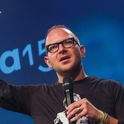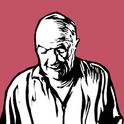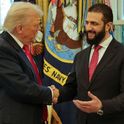In his clinic on Harley Street, Ghassan Abu Sitta does facelifts, brow lifts, lip lifts and blepharoplasties. Today, in Beirut, he tends to blast injuries, amputations and crushed limbs. His internet connection is not strong enough to carry a video call, so I only have his voice (a soft Scottish accent with an Arabic inflection) and a WhatsApp profile picture—dark square spectacles, a salt-and-pepper beard.
In March, Abu Sitta was elected the rector of the University of Glasgow, his alma mater. On Monday 16th September, there was a ceremony for the start of the academic year. It was a “joyful” celebration. He wore black and gold robes. The next day, Israel triggered pager explosions in Beirut that killed at least 12—including children and two medics—and injured thousands. By Wednesday that week, Abu Sitta had flown to Lebanon and traded the robes for scrubs.
He’s spent the last few hours with recent patients. One is a 13-year-old girl with a blast injury to the face. Around a third of casualties are children, he says. Some no longer have homes to return to after surgery and pile up in the health system, instead of being discharged. “When you drive around Beirut, you’re struck by the number of internally displaced people.” The Lebanese government estimates that Israel’s continuing air strikes have forced a million people from their homes. People now crowd into the schools—all teaching has been suspended and university moved online—and into every empty building. Some remain out in the street.
My whole life has been shaped by a big colonialist project on the Palestinian people
Abu Sitta is the son of a Lebanese mother and a Palestinian father, whose family became refugees during the Nakba (“catastrophe” in Arabic)—a reference to the dispossession of Palestinians that led to the creation of Israel. At his installation as rector, he told the story of a school built by his grandfather in 1920. Nearly three decades later the Haganah, a Zionist paramilitary group, arrived with jeeps and tanks and ethnically cleansed the village, burning down the Abu Sitta family home and the school. The family were driven into a refugee camp in Khan Younis, which now lies in ruins. He sees today’s violence in Gaza and Lebanon as a “continuation of history”, an ongoing Nakba. “My whole life has been shaped by a big colonialist project on the Palestinian people.”
“We’re also witnessing a similar pattern to what was happening in Gaza, in that the Lebanese health system is being targeted,” he says. The day before we speak, the Israeli military shelled two hospitals in south Lebanon, and attacks on adjacent buildings have forced more hospitals to close. In the past year, more than 100 health workers have been killed, nearly 200 wounded and 128 ambulances targeted.
Abu Sitta calls the state of the Lebanese health system “dire”. “This is a country that’s been in severe economic meltdown for several years. The currency has lost 98 per cent of its value, which means that the hospitals don’t have the purchasing capacity to buy the consumables and the medication they need.” A third of doctors and nurses have emigrated. “You kind of feel a fragility in terms of the ability to provide.”
A year ago, Abu Sitta travelled to Gaza with the charity Doctors Without Borders. He returned 43 days later, when a shortage of medical supplies made his work impossible. After launching the Rafah offensive in May, Israeli authorities blocked the entry of medical personnel with Palestinian heritage, preventing him from returning to the Strip. Now, in another war zone, his expertise in trauma-related and reconstructive surgery is critical.
“I do have a sense of duty. I do feel that… I am unable to just watch TV, knowing that I can make a difference.”
But there are sacrifices to be made, too. “It is difficult,” he says. “My family life has been severely disrupted.” But he thinks his wife and children have come to accept his feelings. “I hope that this is something that I instil in my children, that it’s critical in life to do the right thing.”
Last year, counter-terrorism police unexpectedly arrived at their home in London to question his wife about his work. In May Abu Sitta was denied entry to France, where he was due to speak in the French senate about Gaza and international law. A month previously, German authorities had refused him entry to Berlin and put an administrative visa ban on Abu Sitta, in effect blocking him from entering any Schengen country for a year. The ban was later overturned.
The campaign group UK Lawyers for Israel (UKLFI) has sought for Abu Sitta’s medical licence to be suspended, arguing that social media posts attributed to him impaired his fitness to practise. A tribunal has rejected the application to immediately suspend him, though the case is ongoing. UKLFI has another ongoing complaint, this time to the Charity Commission, seeking to bar him from holding office in any UK charity.
“Am I worried? I do worry. Am I surprised? Not in the slightest.” He believes the complaints are politically motivated. “They want to make an example out of you so that others self-censor,” he says. “This is the apparatus that has ensured the genocide is able to continue for a year.” Though the International Court of Justice is not expected to give its judgement for some years on whether the situation constitutes a genocide, Abu Sitta, who has worked as a war surgeon in Iraq, Syria and Yemen, has said the medical crisis in Gaza was like nothing he’d ever seen.
“I am always cognisant of this worry that we allow the [Israeli government] to set the barbarism of their war in Gaza as a kind of ceiling for the normalisation of brutalism in war, so we’re no longer shocked.” Invoking Judith Butler’s phrase, he talks about the “ungrievability” of over 20,000 dead or missing Palestinian children.
The “televised brutality” of the war in Gaza “has continued the process of normalising the complete othering of Arab lives and of Arabs.
“When you get people used to this complete destruction of human life on air, on people’s phones, over a whole year, it continues to completely dehumanise other Arabs in this region.” This dehumanisation, he argues, has precipitated the “non-response” of the international community to the war in Lebanon.
He points out that many of the bombs dropped on Beirut and south Lebanon in the last few days were sold to Israel during its war in Gaza, not before. He is shocked by how quickly Israel’s attacks are accelerating. “My feeling is that it’s going to get worse.” But as war rages and western companies continue to profit from the slaughter, many feel powerless to help. For Abu Sitta, his presence is enough.













